|
|
|
Sort Order |
|
|
|
Items / Page
|
|
|
|
|
|
|
| Srl | Item |
| 1 |
ID:
109594
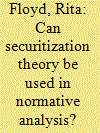

|
|
|
|
|
| Publication |
2011.
|
| Summary/Abstract |
While securitization studies have paid considerable attention to the moral value of desecuritization, they have paid almost no attention to the morality of securitization. In this article, I attempt to rectify that situation by proposing a revision of securitization theory that specifies three criteria that - if fulfilled at the same time - would render a securitization morally right. The criteria are: (1) that there is an objective existential threat; (2) that the referent object of security is morally legitimate; and (3) that the security response is appropriate to the threat in question. Although what is suggested here is considerably removed from the Copenhagen School's original securitization theory, it is akin to that framework insofar as it retains the functional distinction between the security analyst and the securitizing actor. Indeed, the development of criteria that determine the moral rightness of securitization is analogous to the Copenhagen School's devising criteria that determine both the existence and the success of securitization.
|
|
|
|
|
|
|
|
|
|
|
|
|
|
|
|
| 2 |
ID:
083715
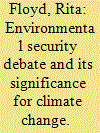

|
|
|
|
|
| Publication |
2008.
|
| Summary/Abstract |
Policymakers, military strategists and academics all increasingly hail climate change as a security issue. This article revisits the (comparatively) long-standing "environmental security debate" and asks what lessons that earlier debate holds for the push towards making climate change a security issue. Two important claims are made. First, the emerging climate security debate is in many ways a re-run of the earlier dispute. It features many of the same proponents and many of the same disagreements. These disagreements concern, amongst other things, the nature of the threat, the referent object of security and the appropriate policy responses. Second, given its many different interpretations, from an environmentalist perspective, securitisation of the climate is not necessarily a positive development.
|
|
|
|
|
|
|
|
|
|
|
|
|
|
|
|
| 3 |
ID:
166747
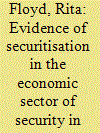

|
|
|
|
|
| Summary/Abstract |
Although the Copenhagen school’s securitisation theory and their sectoral analysis are integral parts of European security studies, the school’s economic sector of security has almost been completely ignored. In this article I examine why this is, and whether it makes sense to retain this sector. In the process I flesh out the logic of securitisation in the economic sector. I suggest that one reason why the economic sector of security has been neglected is that real life examples fitting the Copenhagen school’s logic of security as the exception have – in this sector – remained outstanding. Research in other sectors of security has shown however that securitisation does not need to include extraordinary countermeasures; instead it can play out below the level of the exception. Using alternative formulations developed in securitisation studies that relax the threshold for the success of securitisation, I attempt to locate evidence of economic securitisation by looking at two empirical cases. 1) Russia’s economic blackmail of Ukraine at the start of that country’s ongoing crisis. 2) The EU’s conditional bailout of Cyprus during the Eurozone crisis which necessitated capital controls. On the basis of the empirical evidence gathered I conclude by arguing the case for the economic sector of security.
|
|
|
|
|
|
|
|
|
|
|
|
|
|
|
|
| 4 |
ID:
147970
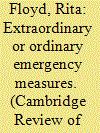

|
|
|
|
|
| Summary/Abstract |
This paper is concerned with two interrelated problems in the Copenhagen School’s (CS’s) securitization theory. The first is the challenge that non-exceptional security polices pose to the theory, which starts from the assumption that securitization is ‘successful’ only when extraordinary emergency measures are adopted. The second arises not from what factors define securitization’s ‘success’, but rather from who does so. Securitization theory suffers from a constructivist deficit because the criterion for the ‘success’ of securitization is set by scholars, whereas a more ‘radically constructivist [theory] regarding security’ would require practitioners to be in charge of defining the ‘success’ of securitization. The paper offers a solution to both of these problems by suggesting that securitization is ‘successful’ only when (1) the identification of a threat that justifies a response (securitizing move) is followed by (2) a change of behaviour (action) by a relevant agent (that is, the securitizing actor or someone instructed by the same), and also (3) the action taken is justified by the securitizing actor with reference to the threat they identified and declared in the securitizing move. It goes on to reject the ideas of a sanctioning audience and of the insistence on existential threats as also set by the CS.
|
|
|
|
|
|
|
|
|
|
|
|
|
|
|
|
| 5 |
ID:
157725
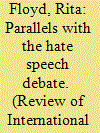

|
|
|
|
|
| Summary/Abstract |
This article argues that public expressions of Islamophobia are best understood as securitising requests (that is, calls on powerful figures/bodies to treat an issue in security mode so that extraordinary measures can be used to combat it), especially in those cases where Muslims are feared and disliked because of the perception that Islamic people are prone to terrorism. This article argues that harmful and derogatory securitising requests targeting racial, ethnic, or religious minorities are on par with hate speech and it highlights the fact that many contemporary societies are now seeking legal protections against such security speech (expressed most notably in the desire to ban Islamophobia). It is from this perspective that this article poses an important research question: With a view to protecting those adversely affected, are legal protections against harmful and offensive securitising requests justified? The research question can be answered by drawing parallels to the existing hate speech debate in legal and political theory. The research reveals that, although the case against legal protections of harmful and defamatory security speech is ultimately more convincing, security speech alone can be so damaging that it should be informed by a number of ethical considerations. This article goes on to suggest three criteria for governing the ethics of requesting securitisation. As such this article fills a lacuna in the ‘positive/negative debate’ on the ethics of security that has engaged with securitisation, but that has failed to consider the ethics of speaking security.
|
|
|
|
|
|
|
|
|
|
|
|
|
|
|
|
| 6 |
ID:
177546
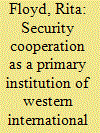

|
|
|
|
|
| Summary/Abstract |
How do western states respond to real or perceived security threats? Do they tend to respond to the same threat in haphazard ways, or does their response follow similar patterns? By analysing the response to a number of diverse contemporary threats – the Crimean crisis, North Korea's nuclear proliferation, climate change and the 2014–2016 Ebola epidemic – this article shows that the security responses by different western states to the same threat tend to be consistent across states, while they also tend to follow a seemingly self-evident pattern of behaviour. In light of these findings, the article suggests that the joint pursuit of security (for short: security cooperation) has replaced war as a primary institution at the western core of sub-global international society. In order to make this argument this article develops a new approach to analysing primary institutions: the practice-based method. While this method is inspired by Peter Wilson and Kilian Spandler's idea that practitioners’ behaviour and rhetoric matters to institutional status, it draws analytical purchase also from Emanuel Adler and Vincent Pouliot's influential practice-based theory to International Relations.
|
|
|
|
|
|
|
|
|
|
|
|
|
|
|
|
|
|
|
|
|